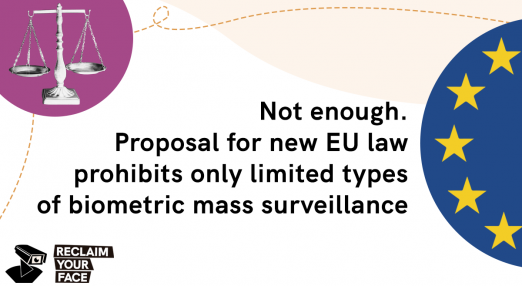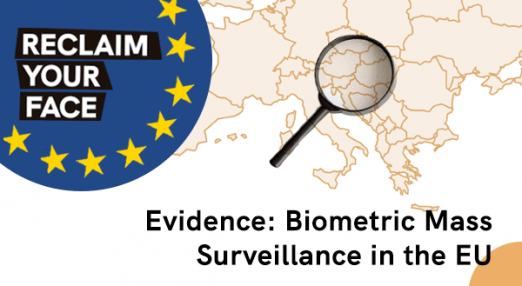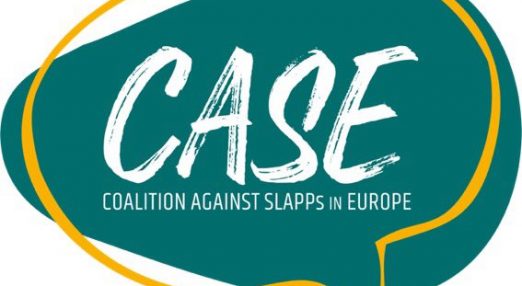France’s highest court validates mass surveillance in the long term
On 21 April, the Conseil d’Etat, France’s highest administrative court, released its decision on mass telecom surveillance. EDRi's member La Quadrature du Net (LQDN) shares its first impressions on this disconcerting ruling which puts the European Union’s legal order at risk.
Filter resources
-

France’s highest court validates mass surveillance in the long term
On 21 April, the Conseil d’Etat, France’s highest administrative court, released its decision on mass telecom surveillance. EDRi's member La Quadrature du Net (LQDN) shares its first impressions on this disconcerting ruling which puts the European Union’s legal order at risk.
Read more
-

European Parliament confirms new online censorship powers
EU regulation against ‘terrorist’ content online (TERREG) was approved without a final vote by the European Parliament on April 29th. The regulation will harm our ability to freely express ourselves and access information online.
Read more
-

New AI law proposal calls out harms of biometric mass surveillance, but does not resolve them
On 21 April 2021, the European Commission put forward a proposal for a new law on artificial intelligence. With it, the Commission acknowledged some of the numerous threats biometric mass surveillance poses for our freedoms and dignity. However, despite its seemingly good intentions, the proposed law falls seriously short on our demands and does not in fact impose a ban on most cases of biometric mass surveillance – as urged by EDRi and the Reclaim Your Face coalition.
Read more
-

How Austria wants to implement upload filters and ancillary copyright
EDRi's member epicenter.works sheds light on the Austrian implementation of the controversial Copyright Directive passed in the EU Parliament in 2019. As positive as some draft provisions regarding upload filters are, the Austrian implementation of ancillary copyright is poor.
Read more
-

Anonymity is indispensable
Would an anonymity ban on social media be a good solution to counter all the hatred on these platforms? We were asked this question by a national newspaper in response to such calls. Here is the reaction. of EDRi's member Bits of Freedom.
Read more
-

EDRi-gram, 22 April 2021
Issues of non-discrimination and fundamental rights would have to be at the core of the approach to artificial intelligence, rather than considered after competition and industrial policy. A truly people-centred AI regulation would take a step back and acknowledge the inherent harms AI will perpetuate if deployed for certain purposes.
Read more
-

EU: New “ad-hoc working group” on vaccine passports starts work – in secret
EDRi's member Statewatch shares that discussions amongst EU member states on how to approach plans for digital vaccination certificates are taking place in a new "ad-hoc working group", a format that is not likely to foster transparency - particularly given that the group has said it will not be keeping "minutes as such".
Read more
-

EU’s AI proposal must go further to prevent surveillance and discrimination
The European Commission has just launched the EU draft regulation on artificial intelligence (AI). AI systems are being increasingly used in all areas of life – to monitor us at protests, to identify us for access to health and public services, to make predictions about our behaviour or how much ‘risk’ we pose. Without clear safeguards, these systems could further the power imbalance between those who develop and use AI and those who are subject to them.
Read more
-

Civil society calls for stronger protections for fundamental rights in Artificial Intelligence law
In light of the recently leaked draft of the Regulation on A European Approach For Artificial Intelligence from January 2021 , EDRi and 14 of our members signed an open letter to the president of the European Commission Ursula von der Leyen to underline the importance of ensuring the necessary protections for fundamental rights in the new regulation.
Read more
-

EDRi-gram, 7 April 2021
Reflecting on the increased challenges to our digital rights, we realised how imperative it is that the field truly reflects everyone in European society. This means improving representation in the digital rights field, but more crucially undoing the power structures preventing us from protecting digital rights for everybody. Approaching digital rights through the lens of decoloniality invites us to interrogate how digital space is occupied, the people who are displaced, and the mechanisms of extraction it requires to exist. This process requires extra work, extra care, extra patience, extra humility as we interrogate that what seems natural.
Read more
-

Evidence shows a European future that is dystopian: #ReclaimYourFace now to protect your city
The latest evidence shows that biometric mass surveillance is rapidly being developed and deployed in Europe without a proper legal basis or respect for our agency as self-determined and autonomous individuals. No one is safe, as our most sensitive data like our faces, eyes, skin, palm veins, and fingerprints are being tracked, traced and analysed on social media, in the park, on the bus, or at work.
Read more
-

The Need for a Council of Europe Recommendation on Combatting SLAPPs
104 civil society organisations call on the Council of Europe (CoE) to act urgently on the growing threat of Strategic Lawsuits Against Public Participation (SLAPPs).
Read more
